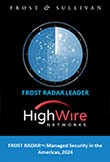Once reserved for enterprise-class networks, Zero Trust security is now a hot pursuit for smaller organizations, too. Two-thirds (64 percent) of midmarket firms and 21 percent of small and medium businesses (SMBs) consider adopting Zero Trust cybersecurity as either very important or important, according to new research from Techaisle. The study also found that 35 percent of midmarket firms and 14 percent of SMBs plan investments in Zero Trust solutions.
Despite its growing popularity, Zero Trust is largely misunderstood by this market segment. To begin with, they may not realize that Zero Trust isn’t a product but a framework that requires a deliberate, careful strategy to implement correctly. This knowledge gap presents an opportunity for MSPs to educate their customers about Zero Trust and help them build their network security strategy.
What is a Zero Trust Cybersecurity Framework?
Zero Trust is a cybersecurity model that assumes any user or device attempting to access a system or data is untrusted, whether inside or outside the network perimeter. Every access request must be authenticated, authorized and validated before granting access.
The Zero Trust approach minimizes attack surfaces by segmenting a business’s network, restricting lateral movement, and providing access controls based on the user’s identity, role and context. Additionally, access controls are defined and enforced at multiple layers — specifically the network, application, data and identity layers.
What solutions make up a Zero Trust Cybersecurity Framework?
An effective Zero Trust cybersecurity framework typically includes the following functionalities:
- Identity and Access Management (IAM)
- Network Segmentation
- Data Security
- Endpoint Security
- Application Security
- Two-factor or Multi-factor Authentication
- Analytics and Automation
- Policy and Governance
- Threat Intelligence
- Incident Response
Why should SMBs and midmarket companies adopt a Zero Trust Cybersecurity Framework?
With cyberthreats becoming more complex and clever, businesses must ensure complete security across their networks. Consider these benefits of a Zero Trust approach:
- Secure cloud environments – Modern work increasingly relies on cloud-based applications and services to conduct regular business operations. Since the cloud is outside of network perimeters, these solutions create a vulnerability that cybercriminals exploit to breach business networks. Zero Trust practices ensure security by permitting only interactions with validated cloud apps and services.
- Secure remote workforce – Remote and hybrid work models have become popular due to their flexibility and scalability but have opened new avenues for cyberattacks from public and home networks. Following a Zero Trust framework, no one can access a business’s network without authentication, ensuring your team can collaborate remotely without risking the business network.
- Protection against insider threats – Insider threats originate within a business’s network perimeter and can include intentional abuse of administrative access or unintentional credential breaches from phishing or malware. Zero Trust policies treat internal and external access attempts equally. All entries must be authenticated, authorized and validated so compromised accounts or bad actors are identified and blocked before they can access sensitive information.
- Protection against Advanced Persistent Threats – Advanced persistent threats (APTs) use sophisticated methods and substantial resources to target and infiltrate business networks with the goal of a prolonged system intrusion. With Zero Trust methods, every network access attempt must be authenticated and validated, making it more challenging for bad actors to disrupt and leech data for extensive periods.
- Compliance with industry data privacy regulations or standards – With cybercrime’s growing threats and successes, adherence to industry data privacy regulations and standards becomes increasingly important to organizations. A Zero Trust approach calls for compliance with rules such as General Data Protection Regulation (GDPR), the EU’s data protection law; Health Insurance Portability and Accountability Act (HIPAA), the U.S. government’s health information privacy rule; and Payment Card Industry Data Security Standard (PCI DSS), the credit card data security standard.
How can MSPs help SMBs and midmarket companies adopt a Zero Trust Cybersecurity Framework?
MSPs can play a critical role in helping SMBs and midmarket companies adopt a Zero-Trust Cybersecurity Framework. Here are some ways MSPs can assist:
- Training and Education – MSPs have ample resources and assistance available to help educate employees.
- Assessment and Planning – MSPs can review a business’s security framework and develop custom solutions supporting that network’s specific needs.
- Implementation and Integration – MSPs are the experts and know how to implement and integrate their solutions quickly and effectively.
- Managed Services – MSPs take care of all the ongoing management and maintenance of their clients’ solutions, unburdening clients’ IT teams and saving them time.
- Compliance – MSPs are already up to date on all the latest industry regulations and standards, so businesses don’t have to worry about accidentally breaking guidelines
- Security Service Consultation – Bring advanced security services to their customers leveraging a partnership with High Wire Networks
How Can SASE Help MSPs Support a Zero Trust Cybersecurity Framework for SMBs and Midmarket Enterprises?
Secure Access Service Edge (SASE) supports a Zero Trust architecture by implementing Zero Trust principles simply and cost-effectively, particularly for SMBs. Here are some ways that the Overwatch SASE solution by High Wire Networks can support a Zero Trust Architecture for SMBs and midmarket enterprises:
- SaaS application access control
- Secured Internet access for sites and remote employees
- Secure remote private application access
- User and device authentication
- Ransomware and phishing blocking
- Network protection and monitoring
- 24/7 monitoring by expert analysts
- Real-time threat detection and response
- Continuous policy management
Overwatch by High Wire Networks delivers Zero Trust Cybersecurity through MSPs
As Techaisle notes, delivering on Zero Trust Cybersecurity is an ecosystem play, which is ideal for MSPs that can leverage multivendor solutions. High Wire Networks make that easier for MSPs with Overwatch Managed Cybersecurity services, which are supported by best-of-breed solutions, backed by a 24/7 expertly staffed security operations center (SOC) and delivered exclusively through MS
Ready to Deliver Zero Trust Security to Your SMB Clients?
Become a High Wire Networks Overwatch Managed Cybersecurity Partner Today.







